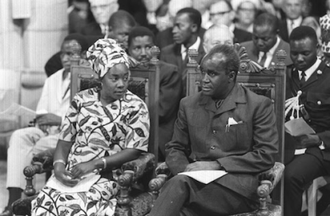Churches mourn passing of Kenneth Kaunda, Zambia's founding president

President Kaunda and his wife in Uppsala cathedral during opening service of WCC Fourth Assembly, Uppsala, Sweden, 1968. Photo: WCC
Source: WCC/Vatican News
Zambia's founding president, Kenneth Kaunda, died on 17 June, at the age of 97. He led his country for 27 years and championed Africa's struggles against apartheid and HIV.
Kaunda will also be remembered for his role as an anti-colonial fighter who stood up to white minority-ruled South Africa.
He spoke at the World Council of Churches 4th Assembly in Uppsala, Sweden in 1968, and his words are, more than 50 years later, highly applicable to current times.
"These are challenging and indeed critical times," he said. "The world is at a crossroads in many respects."
He spoke about major decisions on direction and objectives that must be made quickly, not only in Zambia but in the world.
"We must build a united front, a corrective force to remove the dangerous signs of a divided world," he said. "This, in the final analysis, is a moral issue."
Kaunda was part of a generation of leaders who liberated the peoples of Africa from their colonial masters. He was vehemently opposed to colonialism, racism, and apartheid. Kaunda was a proponent of peace and justice in Zambia and throughout Africa.
Kenneth David Kaunda was born on 28 April 1924, the youngest of eight children of a Church of Scotland minister at Lubwa mission in the remote north of the country.
Known also by his African name of 'Buchizya" - the unexpected one - he did menial jobs to earn school fees after his father's death. He went on to work as a teacher and a mine welfare officer before entering politics in 1949 as a founding member of the Northern Rhodesian African National Congress. Later he broke away to form in October 1958 the Zambia African National Congress (ZANC). Because of its vibrancy, ZANC was banned in March 1959 by the British colonial government. However, in a coalition with its rival, Kaunda's new party, the United National Independence Party (UNIP) and the African National Congress party (ANC) of Harry Mwaanga Nkumbula, together campaigned and agitated to finally attain independence from the British government in October 1964.
As President of a new Zambia, Kaunda sought to unite the country under the 'One Zambia One Nation' motto and through appointments to national positions in what came to be known as 'tribal balancing.' Zambia has 73 ethnic tribes, most of which are Bantu-speaking.
Shortly after October 1964, Dr Kaunda's government embarked on ambitious national development projects to construct schools, hospitals and roads. These projects were disrupted by the rise in oil prices, the slump in copper prices on the international market, and Zambia's rising international debt. Copper was for many decades the major foreign exchange earner for Zambia. Kaunda's government nationalised the mining industry, and the economy was highly centralised, which resulted in the increased cost of living. And when one-party states were common in Africa at the time, Zambia also followed suit until public outcry and protests led to the reintroduction of multiparty politics, in 1991.
As a son of a clergyman, Kaunda was always a religious person and maintained good relations with Church leaders. He encouraged freedom of worship, and under his rule, churches thrived. In part, this was because Churches were, in fact, assisting the government's development agenda of providing education and health care delivery to citizens.
Kaunda generally enjoyed harmonious relations with various denominations in the country. His government introduced the philosophy of Humanism which promoted the centrality of the human person in all activities. Kaunda's philosophy of Humanism for Zambia, tinged with socialism, was initially well received by the citizens, but as the country's economy nosedived, Humanism was abandoned when Kaunda lost power in 1991.
After leaving office, Kaunda became an anti-AIDS activist through his Kenneth Kaunda Foundation Children for Africa. He lost one of his sons to AIDS. In the twilight of his life, Dr Kaunda was actively sought after for speaking engagements, advice, and inspiration by various civic and non-governmental organisations in Zambia, Africa and beyond. In his death, Kaunda will forever be fondly remembered and referred to as "the 'Father of the Nation.'
His funeral will take place in private ceremony on 7 July.


















